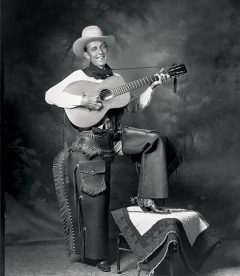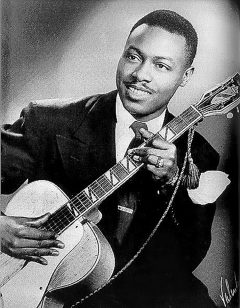Recordially, Lou Curtiss
Terrible Tales of the Old-Time Record Wars
I’ve been collecting records since 1952, when I inherited my Dad’s collection of old 78s (mostly country music with some Bing, Beatrice Kaye, Kay Kyser, Yogi Yorgesson, Spike Jones, and Harry McClintock thrown in). One of my Dad’s favorites had been the old Blue Yodeler Jimmie Rodgers and, wanting to add titles to that collection, I ran into a record in a bin at the Imperial Beach Drug Store by Jimmy Rodgers and his Rocking Four. The tune was “Out on the Road.” (Sounds like a hobo song, right?) Well, I thought this would be a nice addition to his collection of Blue Yodel songs. It was on the Chess label, which at that time (1953) I knew nothing about. Well, it was a different Jimmy Rodgers. It was the one who played with Muddy Waters. I had bought my first Chicago blues record. My Dad didn’t like it much, but I did and soon afterward discovered Howlin’ Wolf, Muddy Waters, Baby Face Leroy, Sonny Boy Williamson, and, of course, Chuck Berry and Bo Diddley on Chess. I was on my way.
Over the years I’ve been on a ton of record collecting trips, met a lot of the people who made and, even stranger, collect these old records. Here are some stories of discovery, of missing out, and glomming onto some fine old records.
One summer in the mid to late ’60s I was on a trip with Nick and John (I won’t use last names) down to Louisiana and Mississippi and into Alabama, looking for 78s and whatever else related. My compadres on this trip had been at it a while longer than I had and had a rather unique approach to acquiring records. They would go door to door and inquire about the availability of old blues records, saying they were traveling evangelists and they were going to have a big burning of these old devil worshiping blues records.
The woman of the house was usually whom they approached and she was more often than not happy to give her husband’s old blues records away for such a moral purpose. Nick even had the gall to ask one lady if she had any old gospel records for them to play over the loudspeaker while the burning was taking place. He got himself a couple of Blind Willie Johnson 78s for his efforts.
On another trip south, down along the Rio Grande in south Texas, Paul, Art, and I got word that a bunch of the radio stations were letting go of a pile of those 16-inch radio transcriptions at a big sale just south of the border in Mexico (I forget the city but it was a small one). Well, we headed down there to find that we were too late and that a company that sold building materials had bought the whole lot. Later we found out that they were using them as siding on shacks in the poorer part of town. Now, people would have Carter Family, Texas Slim Reinhardt, and Mainers Mountaineers records keeping them warm in the winter.
One year, in the mid-1970s, we had Harmonica Frank Floyd out to a San Diego State Folk Festival. He came out a week early to do a gig at UCSD and a couple of nights at Folk Arts Rare Records (we were doing concerts in the store back then). The first thing Frank wanted when we picked him up at the airport was to be taken to the ocean. We took him down to the beach. He got out of the car, took a Mason jar out of his suitcase, got some sea water and kelp weed in it, and announced, “That’s going on the mantle above the fireplace, proof I’ve been to the Pacific Ocean.”
Back in the early 1960s I regularly poked around Arcade Music down at 7th Ave. and F St., looking for old 78s, 45s, and LPs and I got to where I knew a lot of the regulars at least by face if not by name. One guy in particular shares my taste for old doo-wop records and we talked regularly about which groups were the best: who we’d seen live and which ones were the hardest to find. I guess I must have bought a hundred records or so on his recommendation, and he probably bought as many on mine. I never did know his name and I don’t think he knew mine. It was many years later that Jerry at Arcade asked me if I’d heard my friend Frank’s new record and I found out that the guy was Frank Zappa!
It was the first time I was on unemployment and looking for a job in the downtown area. There were so many good old-time records stores downtown and most of them knew me and looked for stuff for me. Not only was there the Arcade (at 7th & F) but there was also Vintage Music, run by Ken Swerilas, up around the corner on E St. between 4th and 5th. Rattner’s was another one, which had two stores (one at 8th and Broadway and another down on 5th a couple blocks south). There was Thearles Music at 7th and Broadway and Lloyd’s Music City on Broadway at about 1st Avenue. There was also a Jukebox Records place up on Broadway between 11th and 12th. It was a good way to spend an unemployment check. I always wondered if the unemployment office had a deal with the record stores. It’s all about location.
Today, I see so many kids with music plugged into their ears. They just don’t seem to realize that one of the purposes of music is to play it loud and drive your parents and neighbors crazy. A generation is growing up that doesn’t bug their parents about music and musical taste. My age was the Age of Revolution, and I started with the most revolutionary music of all. The kind that spins at 78 revolutions per minute.
Recordially,
Lou Curtiss
Reprinted from the February 2011 issue of the San Diego Troubadour.












